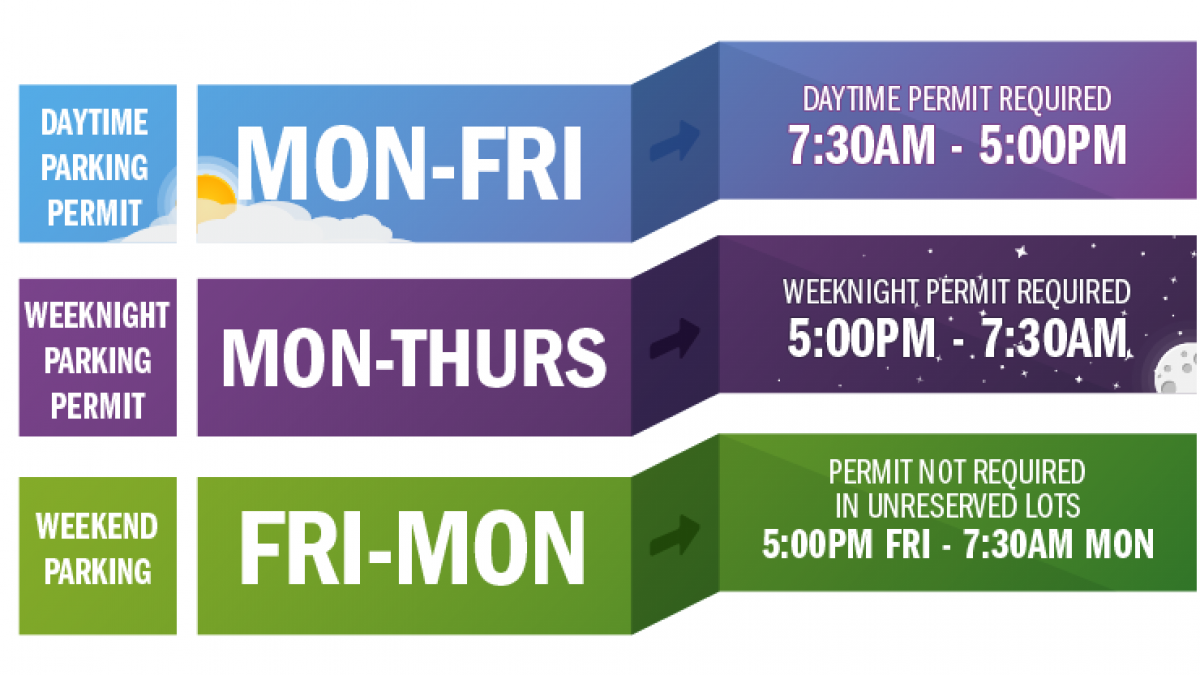Weeknight parking program set to begin this summer
Employees who work between 5 p.m. and 7:30 a.m. Monday evening through Friday morning will need to register for the program through their departments in May and June.

A longstanding plan to charge for weeknight parking will take effect in August.
Employees who work weeknights — between 5 p.m. and 7:30 a.m. Monday evening through Friday morning — will register for the program through their departments in May and June, with student registration in July. Weekend parking on campus will not require a permit, consistent with the current program. The change is part of a five-year transportation and parking plan finalized in 2017.
Transportation and parking staff presented information about the plan at the April 3 Employee Forum meeting and the April meeting of the University Board of Trustees.
Over the last several years, the University has won national accolades — including 15 years as a best workplace for commuters — for creating a commuter-friendly, bike-friendly environment by offering amenities such as fare-free Chapel Hill Transit buses, Tar Heel Bikes sharing programs and Point-to-Point ride services.
But those amenities come at a cost, largely funded by parking revenues. Charging employees for weeknight parking is a way to spread balance the cost of these services, as well as the maintenance of parking lots and decks, more evenly.
“Parking is an entirely receipt-supported enterprise. The University receives no state appropriations for parking facilities, and, under state law, fines collected for parking tickets go to North Carolina’s public schools,” said Cheryl Stout, director of transportation and parking. “Until now, student and employee daytime permit holders, patients and visitors have subsidized the overall cost of the parking system and a portion of the transit costs.”
Sharing the costs
The decision to charge for weeknight parking grew out of a strategy developed over 18 months to enable the University to maintain a sustainable parking and transportation system, Stout said. Key participants in the five-year plan process are the 12-member Advisory Committee on Transportation and the Weeknight Parking Working Group, which both represent a wide range of groups and interests across campus.
In gathering feedback from their constituents, these groups saw growing support for distributing these costs more evenly among all users, Stout said.
“The weeknight parking strategy reduced the need for higher increases to daytime permit and hourly rates,” Stout said. Under the plan, daytime parking permit fees increased 1 percent in the first three years, with no increases in the next two years.
The University’s Board of Trustees approved charging for weeknight parking in 2011. The University slated the new charge to begin in 2014, but then deferred it for consideration in the current plan.
Employees who work between the hours of 5 p.m. and 7:30 a.m. Monday evening through Friday morning will pay from $234 to $402 a year for a weeknight permit, based on the same kind of sliding salary scale used to set the rate for daytime permits. Employees with daytime parking permits or park-and-ride permits will be able to use their permits after 5 p.m. to park at no additional cost in any permitted lot on campus, provided the lot remains unreserved. They will not need to buy a weeknight permit. Neither will students with a daytime parking permit.
Addressing all users’ needs
Stout and her team also met with employees and students who use alternative transportation to come up with options to meet their needs.
Daytime employees who don’t have daytime permits and return to campus frequently at night may buy a weeknight parking permit for $25 annually. Those who are members of the Commuter Alternative Program will receive 20 free weeknight passes. A temporary $1 pass will also be available to people who only need to park occasionally on campus on weeknights.
Visitors may use unreserved lots or metered pay stations located throughout campus, many of which allow for mobile pay through the Parkmobile app. Hourly rates in metered spaces for visitors are $1.50 for South Campus, $1.75 for North and Mid campus. Visitors will be charged $1 to park in unmetered spaces for the evening.
“We worked diligently with the community to make sure we are addressing concerns when we can while making sure we came up with an overall plan that works for UNC,” Stout said.
Operational efficiency and sustainability are priorities reflected in the current Five-Year Plan for fiscal years 2016–22, Stout said.
“In this five-year plan, we implemented a bike-share program [Tar Heel Bikes] that is available for campus use fare-free for students, faculty and staff,” Stout said. “We are also installing LED lighting in five of our parking decks, which has already resulted in a significant reduction in our utility costs.”
In addition, the University will install a modern system for handling access to parking and collecting parking fees. Other enhancements include a new TransLoc app for real-time updates on Point-to-Point Express shuttle service and on-demand service reservations.
To learn more, visit move.unc.edu/parking/weeknight-parking




